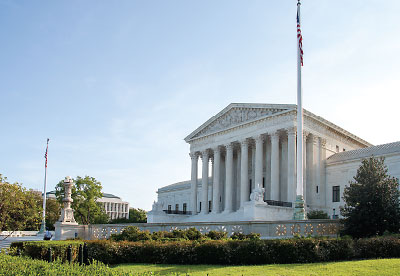The U.S. Supreme Court ruled last month that states can prevent criminal defendants from pleading insanity without violating their constitutional rights.
In the case Kahler v. Kansas, the justices ruled 6-3 in favor of the state. The defendant, James Kraig Kahler, had been sentenced to death in 2011 for the murder of his family. His lawyers wanted to mount an insanity defense, but Kansas is one of four states that eliminated a defendant’s ability to plead not guilty by reason of insanity. (Idaho, Montana, and Utah are the others; Alaska substantially limits the insanity defense.)
Justice Elena Kagan wrote the majority opinion for the court, saying that Kansas takes into account a defendant’s mental health status at both trial and sentencing, but the option of an insanity defense and the scope of its application are “for Kansas to make—and, if it wishes, to remake and remake again as the future unfolds.”
Experts in psychiatry and the law said that the decision could have significant consequences. “The most immediate impact of the case is on Kansas and the four other states that have elected to effectively get rid of their insanity defenses. Their laws will remain valid,” said Paul Appelbaum, M.D., a member of APA’s Committee on Judicial Action. He is the Elizabeth K. Dollard Professor of Psychiatry, Medicine, and Law and director of the Center for Law, Ethics, and Psychiatry in the Columbia University Department of Psychiatry.
He said the longer-term impact of the case is more difficult to predict because states can make their own choices; 45 states and the federal government retain meaningful insanity defense laws.
“Given the long-standing acceptance of insanity as a defense to criminal charges—dating back in the Anglo-American tradition to medieval times—most states will probably choose to retain that option,” Appelbaum said. “Defendants in the states without an effective insanity defense will be most adversely impacted by the decision. More people with severe mental illness will spend decades in prison.”
Debra Pinals, M.D., chair of the APA Council on Psychiatry and Law, agreed. “This case marks a significant finding by the U.S. Supreme Court that there is no constitutional violation when states define insanity narrowly or even abolish it altogether. Persons with serious mental illness who engage in criminal behavior living in states with narrower criteria for insanity, or in states with no insanity defense, will likely be found guilty and sentenced. The ability to consider delusions or other symptoms that impair rational thinking may, in those states, not be considered sufficient to exculpate their behavior.”
Both experts said that the public and lawmakers tend to overestimate the frequency with which the insanity defense is invoked and the likelihood of that defense being successful. A 1994 report by Henry Steadman, M.D., and colleagues in the Journal of Law and Human Behavior found that the insanity defense was invoked at some point in the proceedings in less than 1% of felony cases and was successful only about 25% of the time.
Appelbaum said the depth and breadth of the study—looking at frequency and success rates of the insanity defense in eight states, as well as public perceptions about the defense—has never been matched.
Pinals noted that the Steadman study and similar data from a smaller study are included in the 2014 “American Academy of Psychiatry and the Law [AAPL] Practice Guideline for Forensic Psychiatric Evaluation of Defendants Raising the Insanity Defense.”
“For the small percentage of cases in which the insanity defense is successful,” Appelbaum said, “it is a critical mechanism to avoid punishing people who truly cannot be held responsible for their acts and affording them treatment instead.” Those cases tend to end in negotiated pleas, when all parties agree that an insanity verdict is warranted, he said.
Now, because of the Supreme Court ruling, even defendants in those cases are more likely to be found guilty and imprisoned.
“People who acted under the influence of delusions or hallucinations, believing that they were being persecuted by their victim or charged by God with removing evil from the earth, will be found guilty and punished,” said Appelbaum. “The ancient rule that requires moral culpability before guilt can be found will have been abandoned.” ■
The Supreme Court ruling is posted
here.
The 1994 survey by Steadman and colleagues is posted
here.
The AAPL guideline on the insanity defense is posted
here.

